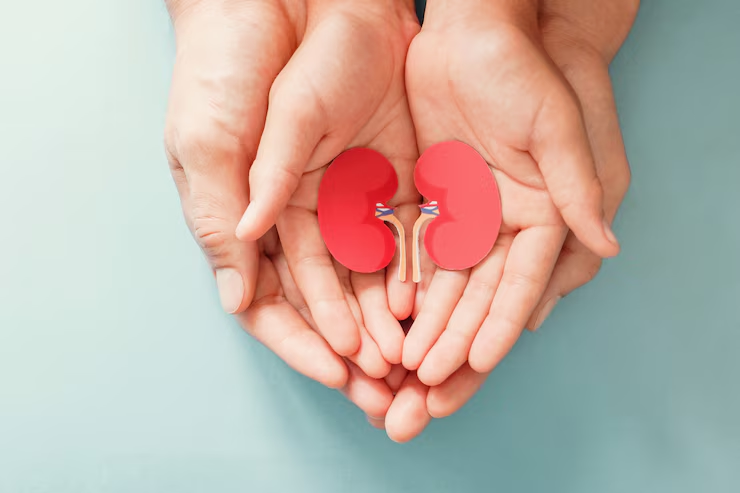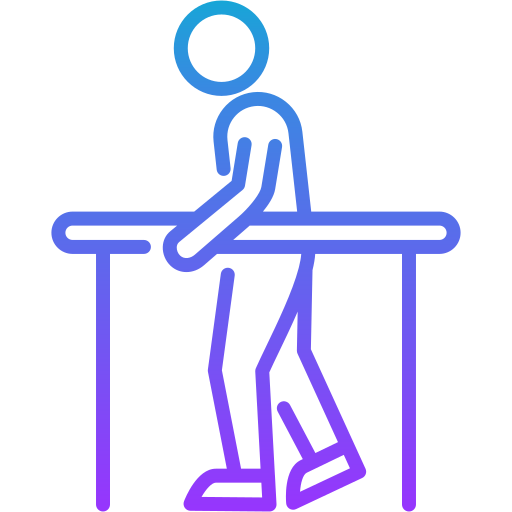kidney transplantation
Home > kidney transplantation

kidney transplantation
A kidney transplant is a surgery to place a healthy kidney from a living or deceased donor into a person whose kidneys no longer function properly.
The kidneys are two bean-shaped organs located on each side of the spine just below the rib cage. Each is about the size of a fist. Their main function is to filter and remove waste, minerals and fluid from the blood by producing urine.
When kidneys lose this filtering ability, harmful levels of fluid and waste accumulate in the body, which can raise blood pressure and result in kidney failure (end-stage renal disease). End-stage renal disease occurs when the kidneys have lost about 90% of their ability to function normally. End-stage renal disease occurs when the kidneys have lost about 90% of their ability to function normally.
Know More
About Kidney Transplantation
-
 Symptoms
Symptoms
-
 Diagnosis
Diagnosis
-
 How We Perform
How We Perform
-
 Why Is Treatment Needed?
Why Is Treatment Needed?
-
 Recovery
Recovery
-
 Rehabilitation
Rehabilitation
-
 Prevention
Prevention
Kidney transplantation is often considered when symptoms from kidney conditions become severe and affect daily life. Common symptoms that may indicate the need for a kidney transplant include:
Key Points:
Persistent fatigue and weakness that do not improve with rest or medication.
Swelling in the legs, ankles, or feet, indicating fluid retention.
Shortness of breath, especially when lying down or with minimal exertion.
Nausea and vomiting, often accompanied by loss of appetite.
Changes in urination patterns, such as decreased urine output or foamy urine.
Persistent itching, a result of waste buildup in the body.
Muscle cramps or twitches, due to electrolyte imbalances.
High blood pressure that is difficult to control with medication.
Decreased mental sharpness, including difficulty concentrating or confusion.
Chest pain, if fluid builds up around the heart lining.
If you or someone you know is experiencing these symptoms, it’s essential to consult a healthcare provider for evaluation and potential referral to a transplant center.
1. Blood Tests
Glomerular Filtration Rate (GFR): Measures how well your kidneys filter blood. A GFR below 15 indicates kidney failure, often necessitating a transplant.
Creatinine Levels: Elevated creatinine levels can signal impaired kidney function.
Blood Urea Nitrogen (BUN): High BUN levels may indicate kidney dysfunction.
2. Urine Tests
Urine Albumin-to-Creatinine Ratio: Detects protein leakage into urine, a sign of kidney damage.
Urinalysis: Screens for abnormalities like blood, protein, or infection.
3. Tissue Typing (HLA Typing)
Determines the compatibility between donor and recipient by analyzing human leukocyte antigens (HLA). A closer match reduces the risk of organ rejection.
4. Crossmatching
Involves mixing donor and recipient blood samples to check for potential immune reactions. A negative crossmatch indicates compatibility. UCSF Health+2Mayo Clinic+2Wikipedia+2
5. Imaging Studies
Ultrasound: Assesses kidney size, structure, and blood flow.
CT Scan/MRI: Provides detailed images to evaluate kidney anatomy and detect abnormalities.
6. Renal Biopsy
Involves removing a small kidney tissue sample for microscopic examination to diagnose specific kidney conditions.
The kidney transplantation procedure involves replacing a diseased kidney with a healthy donor kidney to restore normal kidney function and improve the patient’s quality of life. This surgery is performed using advanced techniques to ensure optimal outcomes.
Key Points:
Anesthesia Administration: General anesthesia is administered to ensure the patient is comfortable and pain-free during the surgery.
Incision and Placement: An incision is made in the lower abdomen, and the donor kidney is placed into the body. The donor kidney’s arteries and veins are connected to the recipient’s blood vessels, and the ureter is attached to the bladder.
Preservation of Native Kidneys: The recipient’s own kidneys are typically left in place unless they are causing complications such as high blood pressure, kidney stones, or infection.
Closure and Dressing: The incision is closed with sutures or staples, and a bandage is applied.
Post-Surgery Monitoring: After the surgery, the patient is closely monitored for signs of organ rejection and to ensure proper kidney function.
This procedure is performed under general anesthesia and typically takes 3 to 4 hours. Most patients are discharged from the hospital within a week, with follow-up appointments scheduled to monitor kidney function and overall health. The success rate of kidney transplant surgery is high, significantly improving the patient’s quality of life compared to dialysis.
Kidneys play a vital role in filtering waste, balancing electrolytes, regulating blood pressure, and producing red blood cells. When they fail, harmful substances accumulate in the body, leading to symptoms such as fatigue, swelling, shortness of breath, nausea, and confusion. These symptoms significantly impair quality of life and can be fatal without appropriate treatment.
⚠️ Risks of Untreated Kidney Failure
Fluid and Waste Buildup: Accumulation of toxins and excess fluid can cause swelling, high blood pressure, and heart complications.
Anemia: Reduced erythropoietin production leads to low red blood cell counts, causing fatigue and weakness.
Bone Disease: Imbalances in calcium and phosphorus can weaken bones, increasing fracture risk.
Electrolyte Imbalances: Elevated potassium levels can lead to dangerous heart arrhythmias.
Cardiovascular Issues: Chronic kidney failure increases the risk of heart disease and stroke.
🏥 Treatment Options
Dialysis: A temporary solution that filters waste from the blood but does not fully replicate kidney function. It requires ongoing sessions and does not prevent long-term complications.
Kidney Transplantation: Offers a permanent solution by replacing the failed kidneys with a healthy donor kidney, restoring normal kidney function and significantly improving quality of life.
🏥 Immediate Post-Surgery Period (Hospital Stay)
Duration: Typically 5–7 days.
Monitoring: Close observation for signs of complications and organ function.
Pain Management: Medications to manage discomfort.
Initial Kidney Function: The new kidney may begin producing urine immediately or take a few days. Temporary dialysis might be necessary until it starts functioning.
🚶♂️ Early Recovery (Weeks 1–4)
Physical Activity: Gradual increase in activity, starting with short walks.
Driving: Avoid driving for 2–4 weeks due to medications affecting coordination.
Work/School: Most individuals can return within 6–8 weeks, depending on their condition.
Dietary Considerations: Focus on a balanced diet rich in fruits, vegetables, lean proteins, and whole grains. Limit salt, sugar, and avoid raw or undercooked foods.
🏋️♂️ Intermediate Recovery (1–3 Months)
Exercise: Engage in light aerobic activities like walking, swimming, or yoga, as approved by your healthcare team.
Lifting Restrictions: Avoid lifting heavy objects (over 10 pounds) for the first 6 weeks.
Follow-Up Appointments: Regular check-ups to monitor kidney function and adjust medications.
💪 Long-Term Recovery (3–6 Months and Beyond)
Physical Activity: Most individuals can resume normal activities, including strenuous exercise, after 3–6 months.
Medication Adherence: Lifelong use of immunosuppressants to prevent organ rejection. Regular monitoring for side effects is essential.
Lifestyle Modifications: Maintain a healthy weight, manage blood pressure, and avoid infections.
⚠️ When to Contact Your Healthcare Provider
Seek medical attention if you experience:
Fever or chills
Decreased urine output
Swelling or pain near the transplant site
High blood pressure
Signs of infection (e.g., redness, warmth, discharge)
Early detection of complications can significantly improve outcomes.
🧠 Emotional and Mental Well-being
It’s normal to experience a range of emotions during recovery. Engage in support groups, counseling, or mindfulness practices to manage stress and anxiety. Open communication with loved ones and healthcare providers is crucial.
Kidney transplant rehabilitation is a comprehensive process that encompasses physical recovery, emotional support, and lifestyle adjustments to ensure the long-term success of the transplant. Here’s an overview of what to expect during this phase:
🏃♂️ Physical Rehabilitation
Early Post-Transplant (Weeks 1–4)
Activity Level: Engage in light activities such as walking and stretching.
Exercise: Begin with low-impact exercises as recommended by your healthcare team.
Avoid: Strenuous activities, heavy lifting, and high-impact exercises.
Intermediate Phase (1–3 Months)
Increase Intensity: Gradually incorporate moderate exercises like cycling or swimming.
Monitor: Pay attention to your body’s response and adjust activities accordingly.
Long-Term Rehabilitation (3–6 Months and Beyond)
Return to Normal Activities: Most individuals can resume normal daily activities, including work and exercise.
Consultation: Always consult with your healthcare provider before starting any new exercise regimen.
🧠 Emotional and Psychological Support
Undergoing a kidney transplant can be emotionally taxing. It’s normal to experience a range of emotions during the recovery period. Seeking support from family, friends, or a mental health professional can be very helpful. Support groups for transplant patients can also provide a sense of community and understanding. These groups offer a platform to share experiences and coping strategies.
🥗 Nutritional Guidance
Dietary Adjustments: Follow a balanced diet rich in fruits, vegetables, lean proteins, and whole grains.
Limit: Reduce intake of salt, sugar, and foods high in potassium and phosphorus.
Hydration: Maintain adequate fluid intake as advised by your healthcare provider.
🩺 Medical Monitoring
Regular Check-ups: Attend all scheduled follow-up appointments to monitor kidney function and overall health.
Medication Adherence: Take prescribed immunosuppressive medications as directed to prevent organ rejection.
Watch for Complications: Be vigilant for signs of infection, rejection, or medication side effects.
🧘 Lifestyle Modifications
Avoid: Smoking and excessive alcohol consumption.
Limit: Exposure to crowds and individuals with infections during the initial recovery period.
Sun Protection: Use sunscreen and protective clothing to minimize sun exposure, as immunosuppressive medications can increase sensitivity to sunlight.
Preventing complications after a kidney transplant is crucial to ensure the longevity and health of the transplanted organ. This involves a combination of medical adherence, lifestyle modifications, and regular monitoring.
🩺 Medication Adherence
Immunosuppressants: These medications are essential to prevent organ rejection by suppressing the immune system. It’s vital to take them exactly as prescribed. Missing doses can increase the risk of rejection.
Regular Monitoring: Frequent blood tests are necessary to monitor drug levels and kidney function, ensuring the transplant is functioning properly.
🥗 Healthy Lifestyle Choices
Balanced Diet: Consume a diet rich in fruits, vegetables, lean proteins, and whole grains. Limit intake of salt, sugar, and unhealthy fats to maintain overall health.
Regular Exercise: Engage in moderate physical activity, such as walking or swimming, to maintain a healthy weight and improve cardiovascular health.
Avoid Smoking and Limit Alcohol: Smoking and excessive alcohol consumption can harm kidney function and interfere with medications.
🩺 Regular Medical Check-ups
Frequent Visits: Regular follow-up appointments with your transplant team are essential to monitor kidney function and detect any signs of rejection early.
Blood Pressure Monitoring: High blood pressure can damage the transplanted kidney. Regular monitoring helps in timely management.
🧴 Infection Prevention
Hygiene Practices: Maintain good hygiene to reduce the risk of infections, which can be more severe due to immunosuppressive therapy.
Vaccinations: Stay updated with recommended vaccinations, but consult your healthcare provider before receiving any new vaccines.
☀️ Skin Protection
Sun Safety: Use sunscreen with a high SPF to protect against harmful UV rays, as immunosuppressive medications can increase the risk of skin cancer.
🧠 Emotional and Psychological Support
Mental Health: Managing stress and mental well-being is important for overall health. Consider counseling or support groups to cope with the emotional aspects of post-transplant life.
WHY US?
Why Choose Dr. Ankit Gupta
At our clinic, Dr. Ankit Gupta offers expert care in urology, kidney transplantation, and andrology. With extensive experience in reconstructive and microscopic urology, as well as proficiency in laparoscopic and robotic surgeries, Dr. Gupta employs advanced techniques to ensure optimal outcomes and smoother recoveries for his patients.
70,000+
Patients Experience
10,000+
endoscopic surgeries
1000+
Urologic Oncologist surgeries
1000+
Invasive Urology Surgeries
Check Surgery Cost
We believe in transparency. You can enquire about the Surgery Cost and we will help you with complete detailed treatment process till your recovery.
Frequently Asked Questions
A kidney transplant is a surgical procedure to place a healthy kidney from a donor into a person whose kidneys no longer function properly.
Kidneys can be donated by living donors (usually relatives or close matches) or deceased donors who consented to organ donation.
Eligibility is determined through medical evaluations, including blood tests, imaging, and overall health assessments. Candidates must be healthy enough to undergo surgery and post-transplant care.
The wait time varies widely depending on blood type, donor availability, and region. It can range from a few months to several years.
Risks include infection, bleeding, rejection of the new kidney, and side effects from immunosuppressive medications.
Lifelong immunosuppressive drugs are needed to prevent the body from rejecting the new kidney.
A kidney from a living donor typically lasts 15–20 years, while one from a deceased donor lasts around 10–15 years.
Yes, many people return to work, exercise, travel, and enjoy normal activities, but regular follow-ups and strict medication adherence are essential.
What Our Patients Say
Based on 160 reviews








My experience with Dr. Ankit Gupta was very good. He treated my left kidney stone with laser surgery. I was discharged the next day after the surgery. He is the best urologist and kidney stone doctor in Gurgaon. 🙏
Best Regards
Subodh Rathore

